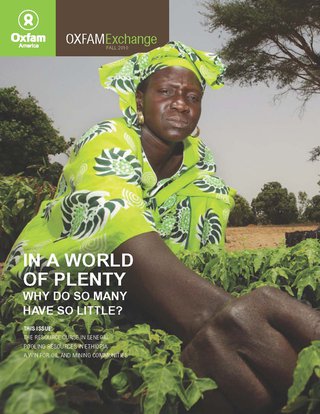
OXFAMExchange Fall 2010
IN A WORLD OF PLENTY
In the town where I live—a community with strong agricultural roots—it’s harvest time. As the days grow cooler and shorter, we savor a wealth of locally grown food. Yet, while our planet produces ample food, the UN recently announced that 925 million people still go hungry.
This is but one painful truth about access to resources on our planet. During the opening remarks at a recent international mining conference, Senegalese President Abdoulaye Wade spoke with elegant simplicity about the injustice he has seen: "[In Senegal], we’ve been mining for centuries, but we remain poor." Where has all that wealth gone?
Wade’s words point to the cause of much of the world’s poverty: injustice. The beauty of this hard fact is that injustice can be fought, can be overcome. That’s what this issue of OXFAMExchange is about: access to resources and Oxfam’s work to see justice served.
Oxfam is on the cusp of launching a campaign for "food justice"—something you’ll be hearing a lot more about in the coming years. Women farmers produce most of the world’s food. Yet—despite hard work—many of these women and their families go hungry because they lack access to vital resources: land of their own, a steady source of water, and opportunities to sell their crops at a fair price. Oxfam is calling on governments and companies to invest in farmers around the world—in their strength, their resilience—to solve the hunger crisis.
As Meshu Babure, chairwoman of the Jalala Women’s Association in Ethiopia, says, "If we come together and shout loudly, people will hear us. If you shout alone, no one will hear you." I invite you to read Babure’s story and the others in this issue. Then, let us come together and raise our voices against injustice.